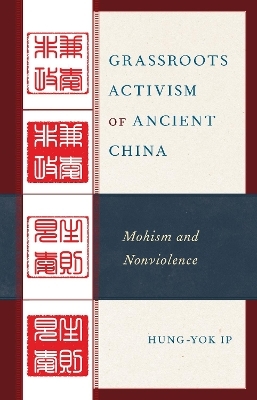
Grassroots Activism of Ancient China
Mohism and Nonviolence
Seiten
2022
Lexington Books (Verlag)
978-1-7936-2234-1 (ISBN)
Lexington Books (Verlag)
978-1-7936-2234-1 (ISBN)
This book examines Mohism as a movement in early China. To analyze how the Mohists pursued power, the author analyzes nonviolence as a goal and strategy of the Mohist movement, the Mohists’ creation of strategic knowledge, and their quest for a personhood that made their activism possible.
This book examines Mohism as a movement in early China, focusing on the Mohists’ endeavor to create power for themselves. Fashioning themselves as grassroots activists who practiced transgrassroots activism, the Mohists hoped to impact the elite by gaining entry in its community, and by influencing it from within. To create a less violent world, they deployed the strategies of persuasion and strategy but did not discard counterviolence in their dealings with the ruling class. To execute their activism, the Mohists produced knowledge that they thought would enable them to employ their nonviolent strategies as well as to mount armed resistance to aggression. Moreover, to ensure that they were capable of practicing their transgrassroots movement so as to change the elite and the world, the Mohists paid significant attention to their personhood, developing a self-cultivation tradition which encouraged the Mohists to move beyond human conditions for self-improvement. The book concludes by situating Mohism in the history of nonviolent activism, and in that of negotiation and conflict resolution.
This book examines Mohism as a movement in early China, focusing on the Mohists’ endeavor to create power for themselves. Fashioning themselves as grassroots activists who practiced transgrassroots activism, the Mohists hoped to impact the elite by gaining entry in its community, and by influencing it from within. To create a less violent world, they deployed the strategies of persuasion and strategy but did not discard counterviolence in their dealings with the ruling class. To execute their activism, the Mohists produced knowledge that they thought would enable them to employ their nonviolent strategies as well as to mount armed resistance to aggression. Moreover, to ensure that they were capable of practicing their transgrassroots movement so as to change the elite and the world, the Mohists paid significant attention to their personhood, developing a self-cultivation tradition which encouraged the Mohists to move beyond human conditions for self-improvement. The book concludes by situating Mohism in the history of nonviolent activism, and in that of negotiation and conflict resolution.
Hung-Yok Ip teaches East Asian and world history at Oregon State University.
Preface
Chapter 1. Introduction: Mohism and Nonviolence
Chapter 2. Sources and Milieu: A Quick Introduction
Chapter 3. Fighting against Violence: Grassroots Activists and Transgrassroots Activism
Chapter 4. Early China: Nonviolence, Knowledge, and Personhoods
Chapter 5. The Use of Nonviolence: Mohist Activism and the Mohist Personhood
Chapter 6. Epilogue: Mohism and the History of Nonviolence
Chapter 7. Epilogue: Mohism, Negotiation, and Conflict Resolution
Chapter 8. Postscript: Mohism, Nonviolence, and Counterviolence
Bibliography
Index
About the Author
| Erscheinungsdatum | 07.02.2022 |
|---|---|
| Verlagsort | Lanham, MD |
| Sprache | englisch |
| Maße | 162 x 227 mm |
| Gewicht | 612 g |
| Themenwelt | Geisteswissenschaften ► Geschichte ► Regional- / Ländergeschichte |
| ISBN-10 | 1-7936-2234-5 / 1793622345 |
| ISBN-13 | 978-1-7936-2234-1 / 9781793622341 |
| Zustand | Neuware |
| Haben Sie eine Frage zum Produkt? |
Mehr entdecken
aus dem Bereich
aus dem Bereich
Erinnerungen
Buch | Softcover (2024)
Pantheon (Verlag)
16,00 €
Universalgelehrter, Polarreisender, Entdecker
Buch | Hardcover (2024)
mareverlag
28,00 €


